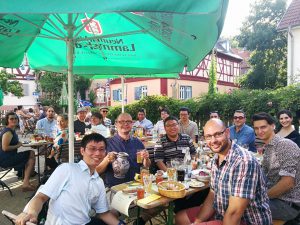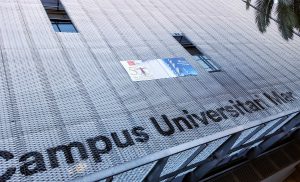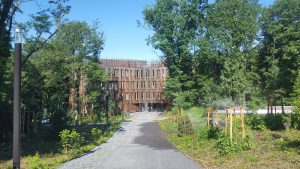
December 20, 2018, by lzzeb
Understanding the impacts of global climate change
A blog by Dr Simon Gosling
A significant amount of my research this year has been conducted within the framework of the Intersectoral Impact Model Intercomparison Project (ISIMIP). This is a large collaborative project involving over 100 scientists from across the globe, who have expertise in using numerical models that simulate the effects of climate change on different ‘sectors’. Some of these sectors include water, agriculture, ecosystems, energy and human health. The overall ISIMIP project is managed by the Potsdam Institute for Climate Impact Research (PIK) in Germany and for over 5 years I have coordinated the global water sector of ISIMIP with my colleague Hannes Müller Schmied from Goethe University in Frankfurt, Germany.
One of the activities that we have found works very well in the global water sector is the organisation of ‘paper-writing workshops’. These are opportunities for us to get together as a sector for 2-3 days, to discuss key research questions that need addressing and to design the experiments and analysis that need to be done to answer them. We also plan how all this can written-up as a series of papers.
Our last workshop was at ETH Zurich in October 2015 and this resulted in several papers from the global water sector that were published in a Focus Collection on climate change extremes in Environmental Research Letters earlier this year. Thanks to support from PIK we were able to organise another workshop this year, which we held at Goethe University in July. It was an invigorating and productive workshop with several ideas discussed and concrete plans of action developed for the months ahead after the workshop. We were also able to identify the sector’s main interests for informing the next stage of the ISIMIP project (ISIMIP3), which is now in its 7th year since inception. My big thanks go to Hannes and Camelia Telteu (Goethe University) for helping me to organise the workshop and also to PIK for funding the event.

Participants of the ISIMIP Global Water Sector paper-writing workshop at the workshop dinner in Frankfurt, July 2018
As sectoral coordinators in ISIMIP, Hannes and I sit on the ISIMIP Strategy Group, and so we put forwards the global water sector’s ideas for the next phase of ISIMIP at the ISIMIP Strategy Group Workshop meeting at PIK in September. We met with other sector coordinators in the project and the overall project coordinators to agree upon the key scientific research questions that we will explore over the next couple of years. A key consideration was undertaking research in time for the next major UN climate report, the Sixth Assessment Report of the Intergovernmental Panel on Climate Change (IPCC).
An area of research that I have been developing over the past few years through ISIMIP is the development of ‘cross-scale’ studies for understanding changes to the global hydrological cycle due to climate change. These are studies where we use numerical models that simulate hydrological processes like river flows and evaporation, which operate at different spatial scales: typically either at the catchment-scale (referred to as regional hydrological models) or the global-scale. This research has engaged me with the regional hydrological modelling community and in October I was able to return to PIK to speak at, and attend, the ISIMIP regional water sector meeting. This was an excellent opportunity to take part in several important group discussions on the topic and I was able to outline an experimental design for a new cross-scale study that will upon a number of previous assessments published in Climatic Change and Environmental Research Letters that have been led by Fred Hattermann (PIK) and I.
My PhD was in climate change risk assessment and I focussed on climate change health impact assessment. I’ve therefore also had a significant interest in global health patterns and climate change, as well as water, since my PhD. Most recently I led an assessment of the risks to EU labour productivity from climate change in a project funded by the European Commission. Following on from this, I attended the first ISIMIP Health Workshop in Barcelona in November. Whilst the water sector has operated in ISIMIP since 2012, health is a new and important addition. Several sub-sectors were defined at the workshop including vector-borne diseases, temperature-related mortality and labour productivity. I engaged in several productive discussions on labour productivity and a small group of us (Shouro Dasgupta, Franziska Piontek and I) outlined a draft simulation protocol and experimental design for labour productivity that will allow us to develop some global-scale labour productivity simulations using the latest climate change projections from ISIMIP3.

Universitat Pompeu Fabra Campus del Mar, Barcelona, the location for the 2018 ISIMIP Health Workshop
It’s been a busy and highly productive year, as a lot of in-depth and extensive discussions with colleagues working in different disciplines, has led to some concrete plans for future research, over the next 2-3 years, to better understand how climate change affects global water resources and human health. I’m looking forward to working on these going forwards.
My thanks to PIK for funding my attendance at all the workshops mentioned above and thanks also to the School of Geography Research Committee for contributing to funding my attendance at the Frankfurt workshop.

The Einsteinturm (Einstein Tower) located on Telegraph Hill within the Albert Einstein Science Park in Potsdam, where PIK is also located.
No comments yet, fill out a comment to be the first



Leave a Reply